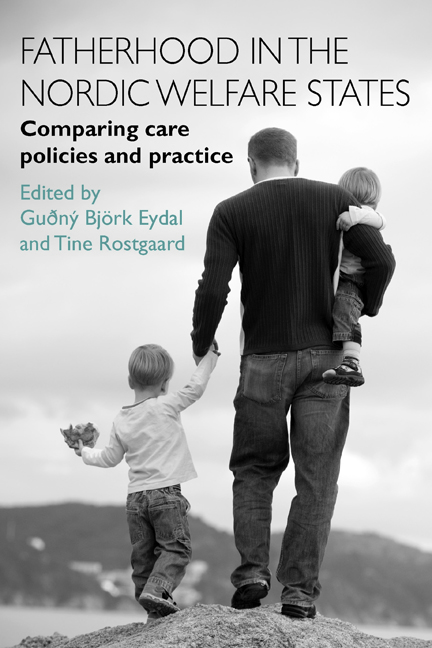Book contents
- Frontmatter
- Contents
- List of tables and figures
- Notes on contributors
- Acknowledgements
- one Introduction
- Theme 1 Fathers, families and family policies
- Theme 2 Fathers in everyday life – culture, work and care
- Theme 3 Constructing fatherhood in different family settings
- Theme 4 Caring fathers and paid parental leave policies
- Theme 5 International reflections on findings
- Conclusions
- Index
three - Nordic family law: new framework – new fatherhoods
Published online by Cambridge University Press: 04 March 2022
- Frontmatter
- Contents
- List of tables and figures
- Notes on contributors
- Acknowledgements
- one Introduction
- Theme 1 Fathers, families and family policies
- Theme 2 Fathers in everyday life – culture, work and care
- Theme 3 Constructing fatherhood in different family settings
- Theme 4 Caring fathers and paid parental leave policies
- Theme 5 International reflections on findings
- Conclusions
- Index
Summary
Introduction
Family law regulates the formal relationship between children and parents and between adults in close emotional relationships (Herring, 2009). It thus provides a definition of what constitutes legal families and legal relationships as in between fathers and their children. Historically, legal ties between children and parents constituted links to rights, property and power, and for decades the legal notions of fatherhood concerned biology and the economic contributions from father to child. In modern times, fatherhoods are strongly related to care and the rights of children in a broad sense. Family law thus deals with the framing and reframing of concepts such as marriage, cohabitation, mother, father, parentage, parental responsibility, residence, contact and child support.
Social and legal studies are currently grappling with the legal status of fathers in connection with often contradictory notions of rights, responsibilities, nurture, care and welfare, and family law reform has been widely noted as limited in dealing with the growing complexities of family life (Collier and Sheldon, 2006; Wallbank, 2010). Legislators are faced with the difficult task of trying to create a rational, unified system based on general principles, bound up with contradictory notions of evolving family ties, presumptions regarding the roles of fathers, the needs of children and gendered realities. Fatherhoods vary ‘across historical epochs and subcultural contexts’ (Lamb and Tamis-Lemonda, 2004, p 2), and many authors have contributed to the redefining and conceptualisation of fatherhoods and the status of fathers in family law in different jurisdictions (Dowd, 2000; Collier and Sheldon, 2008; Collier, 2010; Bridgeman et al, 2011). The Nordic countries share a culture based on common democratic and social values, and are ‘remarkably similar to each other as regards the fundamental perception of the legal system, its design, methodology and basic principles’ (Bernitz, 2007, p 28). This shared culture provides a basis for a legal study of how fatherhoods are understood, constructed and regulated in the context of Nordic family law.
The main aim of this chapter is to examine the development of contemporary Nordic family law and the extent to which common trends can be identified in the defining and redefining of fatherhoods; a further aim is to examine the inconsistencies, contradictions and competing interests in the basic arguments underlying the legal provisions regulating the relationship between fathers and their children, with a special emphasis on the child's perspective.
- Type
- Chapter
- Information
- Fatherhood in the Nordic Welfare StatesComparing Care Policies and Practice, pp. 53 - 78Publisher: Bristol University PressPrint publication year: 2014
- 1
- Cited by



